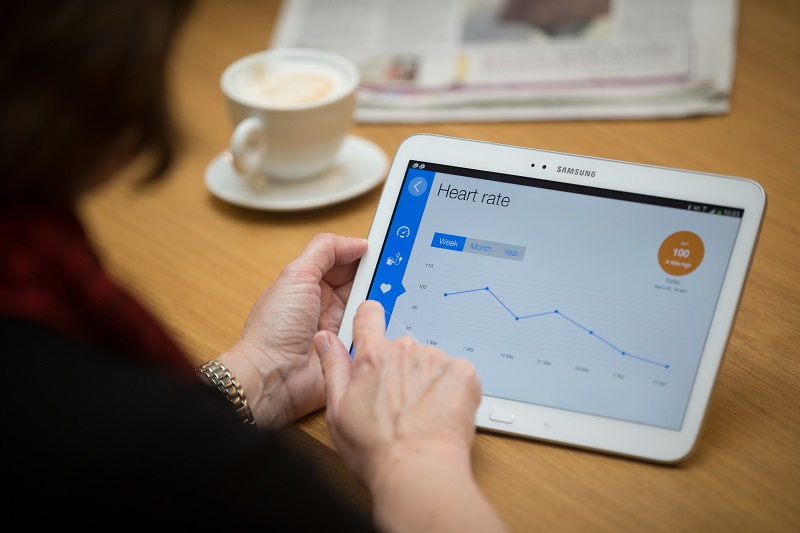Heart failure patients have praised an NIHR Oxford Biomedical Research Centre-supported project that allows them to monitor their condition and communicate with researchers through tablet computers.
A survey of users reported they found the system – through which they monitored their blood pressure, heart rate and weight – was easy to use and helped reassured them about managing their condition.
It is hoped the results will help inform the use of digital technology to help patients manage their heart failure and reduce the need for GP and hospital visits, cutting NHS costs.
The Seamless User-Centred Proactive Provision of Risk-stratified Treatment for Heart Failure (SUPPORT-HF) study saw patients from Oxford’s John Radcliffe Hospital and Swindon’s The Great Western Hospital supported by researchers from the University of Oxford.
Community heart failure service provider Oxford Health NHS Foundation Trust was also involved in the study, set to continue for a further 18 months.
Participants use an Android-based tablet computer that allows them to record readings wirelessly via Bluetooth through a blood pressure and heart rate monitor and electronic weighing scale.
They can review their readings via the tablet, access educational material such as videos about issues such as drug management and send messages to the study team.
The team can then identify patterns that might predict which patients are going to need hospitalisation, enabling them to intervene earlier.
It also allows the team to send text messages to participants to comment on their health status and there are in-built alerts if participants’ weight increases by more than 2kg in four days.
Of the 52 people who took part in a questionnaire on the project, 93 per cent found it easy to use and 78 per cent agreed or strongly agreed that it “helps me manage my health better”.
While 46 per cent had no or very limited prior experience with digital technologies, 83 per cent said they were able to use it on their own.
The average user age for the 45-week study was 77 and the average time to complete the tasks was a minute-and-a-half.
The failure rate in completing tasks was less than five per cent and feedback from patients helped improve usability of the technology.
Researchers said traditional clinician-centred and poorly integrated models of care are not well suited for the management of complex chronic conditions, such as heart failure.
Although the needs and risks of heart failure patients often change over time, patients spend about 98 per cent of their time outside hospitals with no communication with clinicians.
Yet researchers said the evidence for effectiveness and efficiency of digital systems is inconsistent.
They concluded patients benefited from the reassurance and sense of connectivity that the system provided and further studies should take place on integrating it with other health records.
The project was developed by The George Institute for Global Health and the Institute of Biomedical Engineering at the University of Oxford.
It was funded by the NIHR Oxford Biomedical Research Centre, a collaboration between Oxford University Hospitals NHS Trust and the University of Oxford and by an NIHR Career Development Fellowship to Prof Kazem Rahimi, who led the study.
Professor Rahimi, of The George Institute for Global Health, said: “There is a small amount of time that patients spend in hospital and then they tend to be out there on their own.
“This project is about supporting patients with heart failure, to manage their own condition at home.
“We use the information provided by the program to proactively monitor those people minimising the risk of needing to go back to hospital.”
Among those who are using the technology is Kidlington’s Felicity Emptage, 58, who was diagnosed with heart failure in 2011.
She said: “It is perfect, it gives me peace of mind. It is fantastic to use and knowing that you are being monitored I feel safe and secure.”
The results were published this month in European Heart Journal – Quality of Care and Clinical Outcomes.
